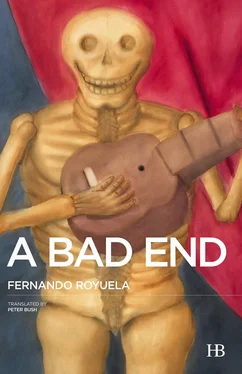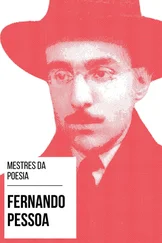Fernando Royuela - A Bad End
Здесь есть возможность читать онлайн «Fernando Royuela - A Bad End» весь текст электронной книги совершенно бесплатно (целиком полную версию без сокращений). В некоторых случаях можно слушать аудио, скачать через торрент в формате fb2 и присутствует краткое содержание. Год выпуска: 2016, Издательство: Hispabooks, Жанр: Современная проза, на английском языке. Описание произведения, (предисловие) а так же отзывы посетителей доступны на портале библиотеки ЛибКат.
- Название:A Bad End
- Автор:
- Издательство:Hispabooks
- Жанр:
- Год:2016
- ISBN:нет данных
- Рейтинг книги:3 / 5. Голосов: 1
-
Избранное:Добавить в избранное
- Отзывы:
-
Ваша оценка:
- 60
- 1
- 2
- 3
- 4
- 5
A Bad End: краткое содержание, описание и аннотация
Предлагаем к чтению аннотацию, описание, краткое содержание или предисловие (зависит от того, что написал сам автор книги «A Bad End»). Если вы не нашли необходимую информацию о книге — напишите в комментариях, мы постараемся отыскать её.
A Bad End — читать онлайн бесплатно полную книгу (весь текст) целиком
Ниже представлен текст книги, разбитый по страницам. Система сохранения места последней прочитанной страницы, позволяет с удобством читать онлайн бесплатно книгу «A Bad End», без необходимости каждый раз заново искать на чём Вы остановились. Поставьте закладку, и сможете в любой момент перейти на страницу, на которой закончили чтение.
Интервал:
Закладка:
I shut up, dumbfounded. My mother had never spoken to me like that before. And never did so again, not even the day she sold me to pudgy Di Battista. She took the same bottle of cognac she’d used to disinfect my gash, filled a glass to the brim, and put it between my lips. “Drink this, you’ll soon see how it will relieve you inside and love’s sorrows will disappear.” I did just that, and sure enough, they left me, never to return.
A kick in the face knocked little Santomás’s teeth out when he was in his teens. It happened when he was trying to explode a Chinese firecracker up a mule’s rear, the kind that come wrapped in starry paper and sound off like little farts. Little Santomás brought that upon himself. It could have been worse. It could have severed his head with its iron shoe or smashed his guts in with a sly kick, but things happened as I described them and not as I’d have wished, so little Santomás simply lost his teeth. “Ay, ay, ay!” he cried, bleeding from the mouth, “it’s bashed my face in, ay, ay, ay, it’s really bashed in.” Little Santomás bawled his way through the village until they stopped his hysterics and dulled the pain with beeswax. Little Santomás was a bastard from the polite, self-righteous classes, the sort that let ladies pass first only because they want to rate their butts from behind and then went to church on Sundays, strutting their stuff with the faith of their elders because they thought they were better than everyone else. Poor fellow, he met a bad end even though he was toothless. It happened in Rome. He burnt up in a passenger plane, but that happened much later, on the eve of the admiral’s assassination, and by that time, I wasn’t around in the village.
Little Santomás, you should know, was baptized and had taken his first communion. Don Vicente the priest let him commune after asking him only if he believed in God or committed sins of the flesh. “Yes, padre, I believe, yes, padre, I sin, but only with my own flesh, because I can’t with other people’s, otherwise I would, but I repent for my nature and my heart grieves and I intend to make amends, and I want to go to heaven rather than hell, because my father says the reds who executed my uncle Amancio are burning in hell, and I don’t want to burn alongside that rabble.”
As I said, a kick knocked out little Santomás’s teeth when he was in his teens; my brother Tranquilino was there, they weren’t on bad terms. He put a Chinese firecracker up a mule’s rear and — bang! — was kicked in the teeth. The poor fellow didn’t want to burn in hell but burnt up in a passenger plane, on a Pan Am Boeing in which he’d flown to Rome to hear Paul the Sixth say mass; it happened the day before Admiral Luis Carrero Blanco was flung through the air as if hobgoblins were pulling his hair. It was when the singer Camilo Sesto was jumpstarting his career ( I shall always fall in love with people who don’t love me ), and it was cold in Madrid, a butcher’s cold that froze the marrow of your bones. He met a bad end. My brother Tranquilino enjoyed the episode and laughed till he dropped. They weren’t on bad terms, but they weren’t on good terms, either. Little Santomás used to call him a bastard, but only on the basis of hearsay; he didn’t really know what the word meant.
I also longed to take my first communion. I told my mother, who told me to speak to Don Vicente. “Go and see the priest, and if he gives you his blessing, so much the better.” Don Vicente was a bastard with a threadbare soutane and greasy baldpate who did his best to avoid me. His fingers were as thin as asparagus tips and his nails so grimy they looked like a barren plot pecked over by magpies. His habit stank of anisette, and leprous deceit marked his thin cheeks a deathly pale. I was wrong to talk to him, but at the time I was fascinated by the spectacle of the liturgy. Don Vicente grabbed one ear and lifted me level with the buttons on his chest. “You runt, you want to take communion, when you’re not even baptized? How can an abortion spawned in sin ever take communion? Off with you to the fields to chew rats, and may the Lord be merciful and forgive you for coming into this world.” Upset by his harangue when I was expecting sympathy, I couldn’t think how to react, and taken aback by the nasty turn of events, I blurted into his face, “I shit on the host, you bastard,” rather timidly, though articulating my words well. “You are arrogant like all your ilk, you wretched dwarf. Leave the house of God this minute, and don’t ever profane it again with your filth. Clear off you, titchy bugger.” The priest spoke with the bloodshot eyes of the demented, and his saliva-soaked words spluttered out. I stumbled, hobbled out of there, deeply unhappy, but with the rich scent of vengeance in my nostrils. I would wait for the right moment and show that priest how far its splendor could reach.
My life is a wasteland; every flower I touch sheds its petals; on my ill-omened path, someone keeps sowing evil I will then reap. For one reason or another, poetry has always been a haven for my spirit, a sacred, inviolable place where beauty and solitude meld in a sublime hypostasis of feeling. Man has many other shelters, but none as perfect as poetry. From its clandestine shelter I have wrought my plans and woven my sticky webs of dreams. Poetry is the language which Providence uses to scatter its whims:. . someone keeps sowing evil I will then reap . Those lines inspired the mechanism for my revenge and gave me the drive and energy to inflict it.
Darkness is always propitious when it comes to profanation. I waited until the evening before the first communion for children who’d reached the required age. The village was sunk in silence or in contrition. Only the distant red lights from El Paquito’s showed any signs of life. I prowled around the church like a wild animal until 3:00 a.m. I checked the priest was sleeping deeply in the adjacent rectory and waited for the dogs to exhaust their ration of barks. Then I walked over to a wall, jumped on a stump, broke a sacristy window with a stone, and slipped inside. Nobody saw me, nobody heard me, nobody smelled me. Up on the tiles, cats were still meowing, relishing the tail end of their suppers. I entered the room. Darkness ruled, and the shadows were accomplices to the defiance throbbing in my heart. I tiptoed. I could have contained that fierce, vengeful desire burning within me. I could have bit my tongue when Don Vicente slapped my face so superciliously, I didn’t have to insult him the way I did, I could have backed down and borne my suffering in the stagnant silence of my consciousness, but Providence sometimes forces man to face his destiny, and then he has no choice but to grasp the blistering embers of fate and perhaps extinguish them with a big, lunatic gob of spit or any other fluid that happens to flow from deep within him, and that’s just what I did. The night was as dark as a soul that dies unconfessed. The following May morning would dawn with Mary’s innocence, and the village children would take their first communion. I crossed the sacristy, a vile little room that smelled of cinctures and chasubles suppurating with the stink of time, and then into the church, before banging into the sculpture of Saint Roch, who was sleeping cloaked in oily lamp light; it was funereal and cosmic, his infamous dog that lost its tail in the nursery rhyme barking at the moon. My silent footsteps echoed off the ashlars of the walls and thundered around the sinewy barrel of the vault. It was like entering the grave of a pope and whiffing his decomposing carcass.
I felt the massive echo from the darkness resonate in my eardrums while a spiral of damp lined my nostrils with the reverential fear generated by the presence of the sacred or the dead. I was a mere child who hitherto had never dared complain about his fate. I was scared, but determined; an inner strength directed my footsteps, acted as my will. I reached the altar, drenched in sweat. My temples were on fire. The cross of Christ filled the place with the grand spectacle of torture. Polychrome wood pitted with crimson sores, his pale body leaked bloodcurdling spume through its ribs. Christ’s head lolled to one side, and because his gaze was fixed on an area of the floor, his presence didn’t deter me, quite the contrary; though a dwarf, I found comfort in that friendly exchange from one death mask to another and grew in strength at the sight of his fake performance — a scrap of wood and a scrap of flesh in a midnight encounter. “God doesn’t exist, mother told me so,” I parroted my brother’s words. Ineffable bliss suddenly flooded my mind. It was the same euphoria I experienced when my mother gave me that medicinal cognac; I was drunk on revenge. The key was in the tabernacle lock. The chalice was inside. An unfolded silk veil lay on top of it in a display of seamless asepsis. I grabbed the chalice, and I put it on the floor under the altar. With one swipe I removed the veil. Inside, a pile of hosts awaited the next day’s communion, the gleeful communion of the children who would feel for the first time the body of Christ on their tongues, an unleavened body of bread that would gradually slip between their teeth like an ancient rite or a pinch of salt. Without a second thought, I pulled down my trousers and, right there, crouching over the chalice, started to empty my bowels. As I remember it, I heard a cock crow three times, or more likely it was my mother’s early-morning cock-a-doodle-do proclaiming her return from El Paquito’s. When I’d relieved my guts, I put the alb back and placed it in the tabernacle, gleaming and apparently immaculate, though profaned within by the steaming blasphemy of my defecation. The stench began impregnating the stole when I locked up. It was a peculiar stench I’d never experienced before. Perhaps it had its origins in the oxidizing of the wheat by my excrement, perhaps it came straight from the pigsty of hell. I’d given myself a fright. I’d often hear men voice empty blasphemies threatening what I’d just done, but I’d never thought the feeling one experienced after actually doing it would be one of such astonishing defiance. I touched nothing, I waved my hands in the air, and, after dispersing the evidence of my presence, I fled the way I’d come — Christ’s cross, the barreled vault, Saint Roch with his doggy-woggy who’d dropped his tail, the broken sacristy window, and the retreating night sky the only witnesses to the insalubrious nature of my mischief.
Читать дальшеИнтервал:
Закладка:
Похожие книги на «A Bad End»
Представляем Вашему вниманию похожие книги на «A Bad End» списком для выбора. Мы отобрали схожую по названию и смыслу литературу в надежде предоставить читателям больше вариантов отыскать новые, интересные, ещё непрочитанные произведения.
Обсуждение, отзывы о книге «A Bad End» и просто собственные мнения читателей. Оставьте ваши комментарии, напишите, что Вы думаете о произведении, его смысле или главных героях. Укажите что конкретно понравилось, а что нет, и почему Вы так считаете.












